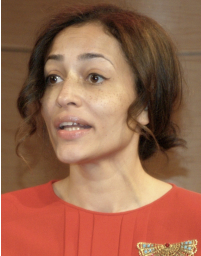On this date in 1975, author and essayist Zadie Smith was born in the London suburb of Willesden to Yvonne (Bailey) and Harvey Smith. Her mother, a Jamaican immigrant, was 30 years younger than her English father. Born Sadie, she changed her name to Zadie at age 14 to make it “zippier.” Her parents divorced when she was a teen.
She graduated from King’s College-Cambridge, where she studied English literature and auditioned unsuccessfully for the Footlights sketch comedy troupe. Her first novel “White Teeth” was completed at age 24 in her final year at Cambridge and published in 2000. She’d received an unheard of advance of $400,000 for a 19-year-old after submitting fewer than 100 pages. In a dust jacket blurb, Salman Rushdie called it an “astonishingly assured debut.” (New York Times, April 30, 2000)
Several well-regarded novels followed: “The Autograph Man” (2002), “On Beauty” (2005), “NW” (2012), “Swing Time” (2016) and “The Fraud” (2023). She also published the novella “The Embassy of Cambodia,” several collections of essays and short stories and a play, “The Wife of Willesden,” adapted from Chaucer.
An interviewer in 2016 noted Smith had “delved deep into Judaism, Islam and more” in her books and asked if she had a faith: “No, I’m the absolute opposite. My mother was absolutely atheistic, she was brought up in the [Jehovah] Witnesses, in Jamaica, she had a very hard time. I make it funny in ‘White Teeth,’ but it wasn’t funny. It was real hellfire stuff.” Her mother later embraced Rastafarianism. (Financial Times, Nov. 11, 2016)
Smith met Nick Laird from Northern Ireland while they were Cambridge students. They married eight years later in 2004. He soon gained renown as a poet and novelist after giving up his law practice. They have a daughter Kit (b. 2009) and a son Harvey (b. 2013).
She took part in a squabble in the media brought on by journalist Lauren Sandler’s contention that having more than one child hurt women writers’ careers. Smith disagreed: “When I think of writers, I really love someone like Ursula Le Guin, who had three kids and lived an entirely domestic life. I feel her children in those books, I feel that the weight of it, her experience of being a girl, a woman, a mother, an old woman, it’s almost overwhelming when you read her.” (Slate, Nov. 16, 2016)
It seems clear from an anecdote Smith told that religion wasn’t pushed on her children. In the middle of the musical “There’s No Business Like Show Business,” which they were watching on TV, one of the characters leaves the family act to become a priest. “My daughter said, ‘What is a priest?’ ” remembered Smith.
Discussing her 2012 novel “NW” (a London postal code), Smith said that while writing it she rediscovered the “life-affirming” existentialists Camus and Sartre. “Camus is the least cynical man on Earth, the most positive, the most life-grabbing. He loved men, he loved women, he loved food, he loved Algeria, he loved France. He was nothing but love for existence, for what there was. … Nick always says this about me, and it’s true, [that] I have to do everything I can to not be a Christian. I have to put all my energy into not being religious. It’s a daily effort.” (Interview magazine, Aug. 24, 2012)
She and Laird have collaborated on a children’s book, and her journalism runs the gamut from film reviews to opinion pieces and cultural criticism. Humor is a frequent component and “finds full expression when Smith considers Justin Bieber in relation to the Jewish philosopher Martin Buber. ‘Meet Justin Bieber!’ is a very funny essay but it is also, and this is the quiet miracle of it, wholly intellectually sound.” (The New Republic, Feb. 20, 2018)
PHOTO: Smith in 2011; David Shankbone photo under CC 3.0.


